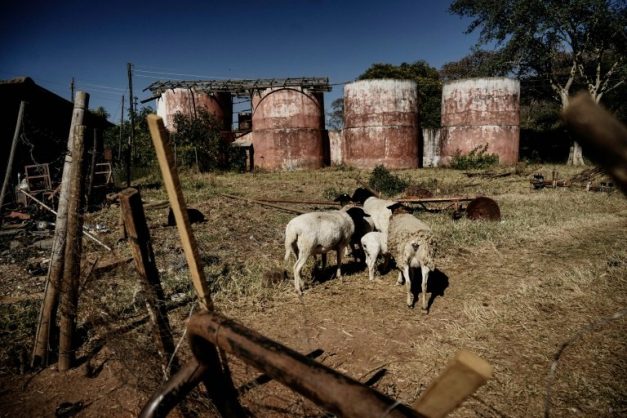
Critics blame the forced evictions of white farmers for a collapse in Zimbabwe’s agricultural production . Picture: AFP / ZINYANGE AUNTONY
Why does South Africa decline real support for its neighbour as Zimbabwe’s embattled government calls for economic help?
There is a gaping chasm between South Africa’s verbiage in support of Zimbabwe and its practical support on the ground.
“There is a contrast between South Africa’s messages of solidarity and its inaction where it matters,” said Ringisai Chikohomero, a researcher at the Institute of Security Studies’ (ISS) peace building and operations in Pretoria.
Afraid of being perceived as kowtowing to the West, especially to the administration of US President Donald Trump, Pretoria has repeatedly argued against the international sanctions imposed on Harare by Western countries following the extensive human rights abuses committed by the regime under former president Robert Mugabe.
Abuses that are continuing today – despite the initial optimism following the military coup at the end of 2017 – according to critics of incumbent President Emmerson Mnangagwa, who was once a supporter of Mugabe.
Zimbabwe is desperately short of cash. It needs foreign currency for consumer goods, including for the procurement of fuel and wheat, as well as to service debt, which the finance minister estimates to be around $16 billion.
And despite Pretoria’s support for the lifting of sanctions, it will not help Zimbabwe with an economic bail-out even though further destabilisation on its northern borders will lead to a fresh influx of economic refugees and exacerbate South Africa’s battle with xenophobia.
So why does South Africa, which was one of the first countries to congratulate Mnangagwa on taking power, decline to walk the talk when it comes to real support for its beleaguered neighbour, as Zimbabwe’s embattled government calls for economic help?
“The just-ended Zimbabwe-South Africa Bi-National Commission session – the third since the inaugural session in 2016 – might have put paid to the many rumours that South Africa would provide Zimbabwe with a much-needed cash injection,” said Chikohomero in a recent ISS article.
“Instead it ended with a joint communiqué that reads more like a political statement of solidarity with little in terms of relief for its cash-strapped neighbour.”
The ISS analyst argued that while the decision to not bail out Zimbabwe is probably based on practical economic calculations, the anti-sanctions rhetoric was a different matter.
“A cursory view of the anti-sanctions call might lead one to the conclusion that lifting sanctions would grant Zimbabwe access to lines of credit from the international market and thereby ameliorate its currency crisis,” said Chikohomero.
However, considerations for South Africa are as much political as they are economic. Pretoria knows that giving bilateral aid wouldn’t necessarily stabilise the Zimbabwean economy
“Without addressing the enduring currency crisis, any bailout would be sucked into an economic black hole just to have Zimbabwe requiring more. The shortage of hard currency only begets more shortages,” explained Chikohomero.
Furthermore, a bailout would exacerbate South Africa’s own economic stagnation and high unemployment rate.
And talk of a bailout would further inflame South Africa’s ongoing problem with intolerance, played out in the repeated xenophobic attacks on citizens from neighbouring countries. And the ruling African National Congress (ANC) doesn’t want to lose support in an election year.
Forced into a position of principle over the realities of geopolitics, South Africa is playing it cautious.



The reality on the ground for the southern African region is simple. In political terms the Europeans, which includes the United States of America), want to and is implementing a program of re-colonialization of , in this particular, Zimbabwe and in general all of the southern African region with an eye on economic enrichment for the white-man in both Europe and the United States of America. The other side of this “boots on the ground resurgence” (though, in reality they never left) is the United States of America’s military chessboard objectives for the continent.
And with this in mind it is easier to see how what former president,
Robert Mugabe, ZANU-PF, the people of Zimbabwe and now the new leader, President HE President Emmerson Mnangagwa has done and is doing by their act of rebellion in the re-capturing, the holding and redistrubtion of the peoples’ back to the people of Zimbabwe a serious blow has been delivered to the over-all plan to re-colonize Zimbabwe. If one can visualize this threat to the recolonization of Zimbabwe now imagine if all of the southern African regional leaders and their peoples decide to take back their lands from the settlers. So we should see the sanctions imposed on the nation and people of Zimbabwe as the cause of financial inflation, massive unemployment, the break-down of social infrastructure, sickness and death due to curable illnesses. And last but not least the political unrest and corruption – yes, corruption, because this too is what these sanctions are intended to bring about, is to be recognized as the West’s design for Zimbabwe and Africa. Zimbabwe and ZANU-PF is the face of “BlackPower” on the continent of Africa today and as such all Africans at home and abroad should support this struggle because it is ours as well.
We should all call for the “END TO SANCTIONS AGAINST ZIMBABWE” Shaheed A. Muhammad